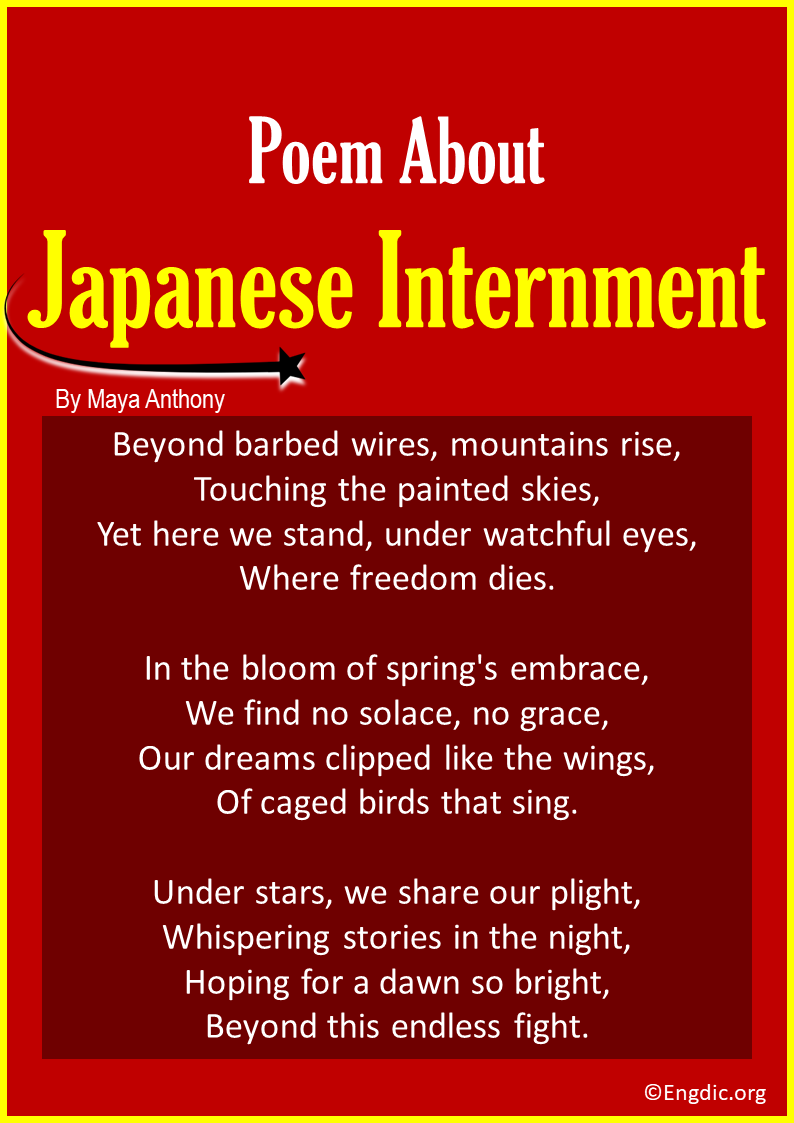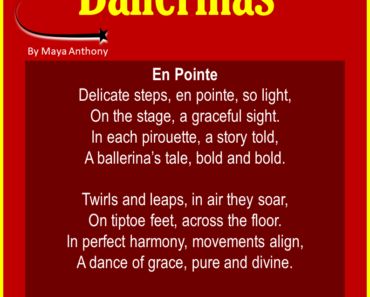Exploring a dark chapter in history, “10 Best Short Poems about Japanese Internment” captures the emotional depth and resilience of those affected. Each poem offers a glimpse into the struggles and hopes experienced during this period, using simple yet evocative language to bring history’s echoes to life.
Poems about Japanese Internment
1. Barbed Wire Dreams
This poem portrays the contrast between the beautiful natural scenery and the harsh reality of internment camps.
Beyond barbed wires, mountains rise,
Touching the painted skies,
Yet here we stand, under watchful eyes,
Where freedom dies.
In the bloom of spring’s embrace,
We find no solace, no grace,
Our dreams clipped like the wings,
Of caged birds that sing.
Under stars, we share our plight,
Whispering stories in the night,
Hoping for a dawn so bright,
Beyond this endless fight.
2. Lost Sakura
Reflecting on the loss of cultural identity and displacement, this poem uses the imagery of cherry blossoms, or sakura, a symbol of Japan.
Sakura blooms we long to see,
Now just a distant memory,
Uprooted from our land, our sea,
In this captivity.
Petals fall like tears unsaid,
On soil where our roots were spread,
Now here, our silent fears we shed,
In sorrow’s bed.
Yet in our hearts, sakura dance,
In dreams, they still advance,
A symbol of our lost romance,
In this harsh expanse.
3. Echoes of Nisei
This poem delves into the experiences of second-generation Japanese Americans (Nisei), caught between two worlds.
Born in a land of liberty,
Now prisoners, without a key,
Nisei we are, in a country free,
Yet bound, we cannot flee.
Our voices, whispers in the wind,
In a world that has not grinned,
Our identities, constantly skinned,
In histories pinned.
Yet within us, a strength untold,
A spirit, brave and bold,
In our stories, new and old,
Our truths unfold.
4. Internment Lullaby
This poem is a metaphorical lullaby sung by a mother in the internment camp, offering comfort in a time of uncertainty.
In this world of wire and wood,
I’d shield you more if I could,
Whispering tales of our neighborhood,
Before misunderstood.
Under the moon’s soft, gentle glow,
I sing of places we know,
Hoping one day, you’ll freely go,
Where cherry blossoms show.
Sleep now, in this quiet night,
Dream of days warm and bright,
A future where all is right,
Beyond this plight.
5. Unseen Seasons
The poem highlights the passing of seasons within the internment camps, unnoticed and uncelebrated.
Seasons change beyond these fences,
Time moves, blurring senses,
Spring’s bloom, summer’s dances,
Lost in life’s expanses.
Autumn leaves, unseen, they fall,
Against these barracks, tall,
Winter whispers, a silent call,
Covering us all.
Yet within, seasons of the heart,
Where memories never depart,
In each season, we play a part,
In hope’s art.
6. Silent Sentinels
Focusing on the guard towers in the camps, this poem symbolizes the constant surveillance and loss of freedom.
Tall towers, eyes that never sleep,
Over dreams shallow and deep,
In their shadow, we weep,
Promises unkept to keep.
Silent sentinels, stark and cold,
Witness to stories untold,
Under their gaze, bold,
Our days unfold.
Yet beyond their reach, our minds soar,
To a distant, peaceful shore,
Where towers guard no more,
In lore.
7. Paper Cranes
Using the symbol of paper cranes, a traditional Japanese art, this poem reflects on hope and resilience amid adversity.
With paper thin and folds so fine,
We craft cranes in a line,
Symbols of a hope divine,
In this confine.
Each crease a prayer, a wish to send,
For this time to mend,
In every crane, a message we lend,
Strength to transcend.
From our hands, these cranes take flight,
In the dim barracks’ light,
Carrying dreams beyond the night,
Out of sight.
8. Forgotten Footsteps
This poem remembers the lives that were uprooted and the silent history of those who lived in the internment camps.
Footsteps echo on these grounds,
Where our freedom was bound,
Stories buried, profound,
In silence, they’re found.
Children’s laughter, now a ghost,
In these walls, we host,
Memories, a lingering boast,
Of what we miss most.
Yet these footsteps, in time’s tide,
Carry tales far and wide,
In history, they reside,
With dignity, stride.
9. Voices from Manzanar
Manzanar, one of the most well-known internment camps, serves as the backdrop for this poem about enduring spirit and identity.
In Manzanar’s dusty plains,
We bear our unseen chains,
Yet in our veins, remains,
Resilience sustains.
Voices rise from these barracks bleak,
In languages we speak,
Stories of the strong, the weak,
A future we seek.
In this desert, life’s ember,
In each face, remember,
A spirit, they can’t dismember,
In every December.
10. Return to the Garden
Ending on a hopeful note, this poem envisions a future where internees return to their homes and gardens, symbolic of healing and rebirth.
One day we’ll leave these gates behind,
To the gardens of our mind,
Where peace and past intertwine,
In a world kind.
We’ll plant our seeds in soil free,
In the land of the cherry tree,
Where our hearts can truly be,
Unbound and spree.
In our gardens, we’ll find rest,
From this journey, this test,
In blooms, our stories are dressed,
Forever blessed.
Read More Poems:







